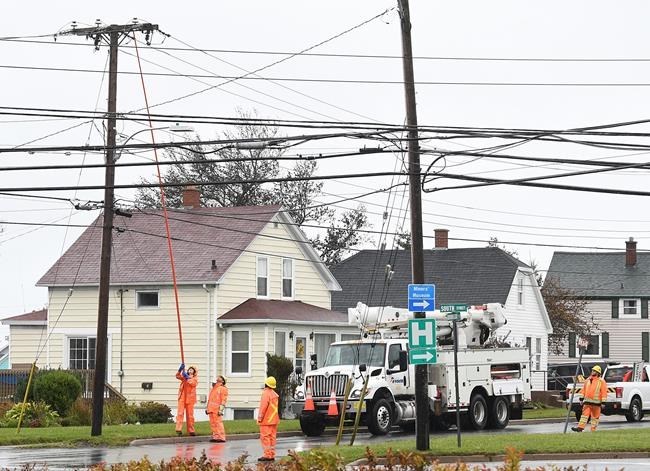HALIFAX — The premier of Nova Scotia has issued a stinging rebuke to the telecommunications companies that serve the province, saying too many residents were still without cellphone service four days after post-tropical storm Fiona roared across the East Coast.
"Nova Scotians have questions about when their service will be restored, how widespread the outages are and what the companies plan to do to ensure this never happens again," Houston said Wednesday in a statement. "There is no question we need our telecommunications companies to step up and be more transparent."
All four companies responded with statements highlighting their co-operation with the province and their efforts to restore service.
The premier said the government had asked Bell Aliant, Eastlink, Rogers and Telus to send representatives to the province's emergency co-ordination centre before Fiona's arrival, but he said none of them was initially willing to co-operate.
"Eastlink, Rogers and Telus declined to attend ... in person during the initial response," the premier said.
Bell Aliant, however, eventually sent someone after the province complained to senior management, but the premier said the representative left after two days to work virtually.
The company issued a statement saying its representative had to move off site Sunday because they had to make their own property safe, but Bell Aliant said they remained connected to the centre. "Both 911 and our emergency responder network also remained fully functional throughout the storm and aftermath," spokeswoman Katie Hatfield said.
"We have also had a representative take part in every (Emergency Management Office) media availability … and are committed to keeping customers updated through the media, our social media channels, websites, call centres and stores."
At the height of the storm, the majority of Bell Aliant's wireless and wireline networks were operational and "at this point are close to being back to 100 per cent," Hatfield said.
Eastlink CEO Lee Bragg said he believes the premier’s comments about the outages are unfair, given the magnitude of the storm, which generated hurricane-force winds and record-breaking storm surges.
As for co-operation, Bragg said it didn't make sense to send an employee to the co-ordination centre until they were briefed about the level of damage.
“It made more sense to have somebody in our network operations centre who had real-time access to the information," he said. “I think that’s maybe (Houston’s) lack of understanding of how the networks are managed .... This was the most co-ordinated effort I’d seen, so I think it’s a little unfair to be critical."
As for Telus, the company argued it has been "a fully engaged participant," actively collaborating with provincial authorities by providing timely updates about repairs.
Telus said it started working with the Emergency Management Office on Sept. 21, two days before the storm arrived, and it has taken part in 15 consecutive calls with the co-ordination centre.
Meanwhile, Houston said he has asked federal Industry Minister François-Philippe Champagne to hold the telecommunications companies accountable for providing information about service outages.
"Other service providers have come together in an effort to make sure Nova Scotians have the information they need, yet the telecommunications companies are consistently missing from the table," Houston said.
Later in the day, Prime Minister Justin Trudeau said Champagne had called a meeting Wednesday night to bring together the major telecom companies.
The prime minister, who was in southwestern Newfoundland to inspect the damage caused by Fiona, said Ottawa wants to make sure people have the service they need and that there is transparency and accountability within the industry
"People rely on telecommunications, particularly in moments of disasters and rebuilding," he said. "And we expect those telecom companies to step up."
A spokesperson for Rogers said the company worked closely with the provincial and federal governments before and after the storm hit.
"As impacted areas were cleared from downed lines or trees, our local teams were able to restore services as quickly as possible," the statement said. "We now have 99 per cent of services restored across the region."
On Wednesday morning, when the premier issued his statement, more than 104,000 homes and businesses in Nova Scotia were still without electricity, which represents 20 per cent of Nova Scotia Power's customers. The outages, which started early Saturday, have had an impact on cellphone service because the backup batteries in blacked-out cellphone towers will die unless a generator is brought in.
Poor cellphone service has also been reported in P.E.I. and southwestern Newfoundland, areas also thrashed by Fiona.
In Ottawa, Infrastructure Minister Dominic LeBlanc said the federal government has been working with industry to build redundancy into Canada's telecommunications services.
"The more backup generators ... the better we're all going to be," LeBlanc told a ministers briefing. "So the government accepts that we have a responsibility ... to ensure that we're doing more, and we're doing it quickly."
LeBlanc said the government won't hesitate to consider regulatory measures if it concludes that industry isn't doing its part.
On Tuesday, NDP Leader Jagmeet Singh told the House of Commons that cell service across Atlantic Canada had been disrupted because the telecom companies had failed to build infrastructure capable of coping with extreme weather. During question period, he asked the Liberal government to force the companies to improve their infrastructure.
Deputy Prime Minister Chrystia Freeland said the government was "working hard with cellphone companies to ensure they give Canadians the service they need."
This report by The Canadian Press was first published Sept. 28, 2022.
— With files from Holly McKenzie-Sutter in Port aux Basques, N.L., Keith Doucette in Halifax and Lee Berthiaume in Ottawa.
Michael MacDonald, The Canadian Press



